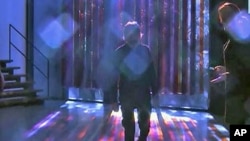Kinetic artist Carlos Cruz-Diez was born and raised in Caracas, Venezuela, but has spent half of his 87 years in Paris. There he developed a worldwide following for works that challenge how we see color. His illusion-filled pieces are now on display at the Museum of Fine Arts in Houston, Texas.
Entering the world of Cruz-Diez is a challenge and a delight for the eyes. In one of the small rooms built for the exhibit, one at first sees blue light but it shifts to yellow, green and other colors as one passes through.
Here's what Carlos Cruz-Diez said he intended. "This is chromo saturation. The purpose is to have color without form. One enters here into raw perception."
The colors one sees here are not really here. The artist explains that they're manufactured by the eye.
Optical illusions
"When you see just one frequency of light, it is disturbing and the eye tries to accommodate itself to the experience and in the process, different tones appear that do not exist in the place."
In another chamber, Cruz-Diez uses light and structure to turn the viewer into part of the art. A lamp projects patterns over the surface of the room and anyone inside it.
Many other works here use simple structures made of plastic and other monochromatic materials to give the impression of shifting colors.
Cruz-Diez said he wants to challenge the notion people have of color and reveal its essence.
Essence of color
"All my work is the product of a long reflection to give another notion to the world of color."
People visiting this exhibit were fascinated by how the artist uses materials to produce the illusion of changing color, and they had their own perceptions of the works.
One visitor said, "I like walking around and looking at them from different angles and seeing how they change."
Another said, "I have seen it before and I keep coming back. There is something about the colors that is also spiritual. It changes your mood."
Varied perspectives
Another man from Mexico saw the works from a Latin American perspective. "There are a lot of very alive colors like pink, orange, red, colors that connect to some pre-Hispanic tradition."
Architects and those who work in design especially like this exhibit. Like Elaine.
"As you can see, the installation is quite clever," said Elaine. "He used different material. He used angles to block your sight to create different, I would say, illusions. Sometimes architects do that, too. So this is kind of inspiring to architecture."
Cruz-Diez is known as a kinetic artist because motion is involved in his works. But most often, the viewer's motion and its interaction with the work make the difference.
Kinetic artistry
The exhibit, called "Color in Space and Time," includes a few of the artist's early paintings, which are traditional representations of people and landscapes.
But most of the works are explorations of color.
Art critics credit Cruz-Diez with re-inventing the notion that color is more than just pigment on a surface; it involves light, the eye and the brain.
The exhibit remains at the Fine Arts Museum in Houston until July 4, 2011.




